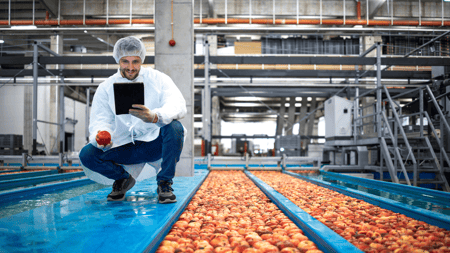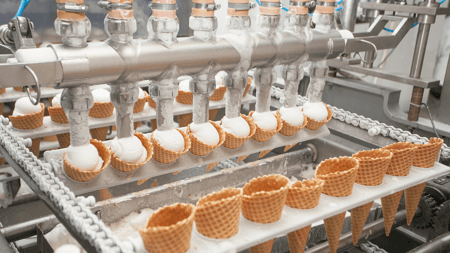In the food and beverage industry, a subpar pump means inconsistent performance and a never-ending battle against breakdowns, resulting in constant maintenance. Installing a better system can transform both your workflow and your profit margins, but where do you begin?
In this blog, we’ll unpack how to choose the right pump for food and beverage–and why Discflo outshines the competition.
 1. Identify Your Application’s Needs
1. Identify Your Application’s Needs
The right pump will make even the most difficult job easy; but no two jobs are the same. Whether you’re pumping delicate egg whites, stringy solids, malt mush or viscous liquids, each application will put different pressure on your system, and thus has different needs.
That’s why the first question you must ask is: what is the pump moving, and what does it need to do to be successful?
2. Identify the Challenges Your Pump will Face
Each food and beverage sector faces its own set of challenges. The ideal food and beverage pump will solve the unique problems hindering your operation’s efficiency.
 Fluids with High Solids Fluids with high stringy solids and sediment present distinct challenges in food and beverage applications. Solid particles–from fruit chunks to animal entrails–are prone to becoming trapped, clogged, or tangled as they pass through pumping systems. This can result in frequent downtime, reduced production efficiency, and damage to pump components. Discflo pumps are best for handling waste such as seeds, stems, skins, and other types of stringy solids.
Fluids with High Solids Fluids with high stringy solids and sediment present distinct challenges in food and beverage applications. Solid particles–from fruit chunks to animal entrails–are prone to becoming trapped, clogged, or tangled as they pass through pumping systems. This can result in frequent downtime, reduced production efficiency, and damage to pump components. Discflo pumps are best for handling waste such as seeds, stems, skins, and other types of stringy solids.
Abrasive Materials Abrasive materials, like slurries and processing waste, cause wear and tear when they come into contact with the interior of a pump. Over time, this damage can lead to costly repairs and replacements and reduce the longevity of a pump.
 High Viscosity Fluids High-viscosity fluids, like pasta sauces, are thick, heavy, and resistant to flow. These difficult-to-pump fluids are more likely to entrap air–which can cause frequent pump malfunctions, downtime, and high-maintenance costs. Viscosity is also directly correlated with shear sensitivity and the challenges it presents.
High Viscosity Fluids High-viscosity fluids, like pasta sauces, are thick, heavy, and resistant to flow. These difficult-to-pump fluids are more likely to entrap air–which can cause frequent pump malfunctions, downtime, and high-maintenance costs. Viscosity is also directly correlated with shear sensitivity and the challenges it presents.
Shear Sensitive Materials Many food and beverage substances are shear sensitive. These materials are vulnerable to degradation and changes in texture and consistency if subjected to excessive force during pumping. This can compromise product quality and result in product loss.
 Delicate Materials Delicate materials, such as those containing fragile fruits or herbs, are easily damaged or degraded during the pumping process. They require gentle handling during processing to preserve texture, flavor, and quality to prevent product loss.
Delicate Materials Delicate materials, such as those containing fragile fruits or herbs, are easily damaged or degraded during the pumping process. They require gentle handling during processing to preserve texture, flavor, and quality to prevent product loss.
Temperature Ranges Extreme temperatures can impact both product quality and pump performance. Temperature change impacts the viscosity and volume of fluids. This can cause leaks and clogs that interrupt the production process. It can also degrade, warp, or otherwise damage pump materials, reducing the pump’s lifespan.
3. Identify Your Budget Goals
If you are searching for a food and beverage pump, chances are your current pump is not performing optimally. In most cases, this isn’t just frustrating–it’s costly. Constantly replacing damaged parts due to poor pump performance affects your bottom line.
The right food and beverage pump will solve the specific issues that cost your business time and money. That’s why it’s important to identify your budget goals before making your decision. This may include reducing life-cycle and replacement parts costs, improving downtime allotment, or preserving product integrity to decrease product loss.
The Right Pump Can Save You Money
T.png?width=100&height=100&name=Discflo%20-%20LI%20(2).png) yson Foods Beef Processing plant faced costly challenges pumping a highly-viscous, hot tallow mixture. Due to frequent dry run conditions and the abrasiveness of the tallow, the pumps used needed to be replaced monthly. Previously, they were spending around $45,000 every six months on maintenance.
yson Foods Beef Processing plant faced costly challenges pumping a highly-viscous, hot tallow mixture. Due to frequent dry run conditions and the abrasiveness of the tallow, the pumps used needed to be replaced monthly. Previously, they were spending around $45,000 every six months on maintenance.
After replacing six pumps in various facilities with Discflo disc pumps, Tyson dramatically reduced its life-cycle costs. With the Discflo disc pumps, the only cost was a monthly inspection–no replacements needed. Ultimately, by using a pump designed for the material they were moving, Tyson saved around $91,000 a year!
4. Find the Right Pump
 From here, you’re better equipped to choose a pump that is suitable for the material being transported, controls the unique challenges of the application, and improves upon specific factors impacting your company’s bottom line.
From here, you’re better equipped to choose a pump that is suitable for the material being transported, controls the unique challenges of the application, and improves upon specific factors impacting your company’s bottom line.
When choosing a pump for food and beverage, there’s a wide range of options. But if you need to pump fluids with high solids, highly viscous material, a shear sensitive product, delicate foodstuff, or abrasive fluids, your options quickly become limited. In these applications, Discflo disc pumps quickly outshine centrifugal, progressive cavity, lobe, and screw pumps.
Low To No Close Tolerances Discflo disc pumps can move up to 80% solids by volume without clogging. This is because our unique open design allows solids–including large and stringy solids–to pass through without getting trapped or tangled in close tolerances. Paired with our laminar flow technology, this helps Discflo succeed where conventional pumps cannot.
![]()
For instance, the screw conveyors at one Welch’s juicing facility were constantly getting clogged with long grape vines. This negatively impacted their transfer rate and profits. After replacing the conveyors with a Discflo pump, the transfer rate immediately increased. As of two years after installation, the pump was still going strong and had not clogged once.
Laminar Flow Technology Discflo disc pumps operate on the unique principles of boundary layer and viscous drag, creating a smooth, pulsation-free laminar flow. This allows them to effectively transport difficult-to-pump fluids without clogging, wear and tear, or product damage.
Tolerates Gas and Air Entrainment Our non-impingent technology creates such a gentle laminar flow, bubbles don’t implode. Since they instead pass through the pump like a solid, Discflo disc pumps can handle up to 70% entrained air or gas with no foaming, frothing, or vapor locking.
No Emulsification or Product Damage As opposed to conventional impellers–which produce violent turbulent flow–our patented Discpac technology produces smooth, non-impingement, laminar flow. This design gently pulls fluid through the pump, protecting even the most delicate and shear sensitive materials.
.png?width=75&height=75&name=Discflo%20-%20LI%20(4).png)
For example, Discflo pumps were installed at a national Egg Products Facility to pump unfiltered egg whites. While their previous pumps could not transport the shear sensitive whites without constant foaming, our laminar flow technology solved this issue altogether.
Low-Maintenance Discflo pumps require very little or no maintenance. Our unique pumping mechanism produces a pulsation-free laminar flow, minimizing contact between the pump and raw material being pumped. With low to no radial load and no close tolerances, our disc pumps avoid the excessive wear that compromise the longevity of conventional pumps.
Custom Solutions for Unique Challenges The food and beverage industry deals with a broad spectrum of difficult to pump materials. With so many unique applications, there’s no one-size-fits-all solution. Luckily, our engineering team loves a challenge–and we’re here to configure a pump that solves the unique issues your operation faces.
Discflo is the Best Choice for Food and Beverage Pumps
The Discflo disc pump offers the food and beverage industries exceptional productivity and low life cycle costs, even in the most challenging applications. Our unique non-impingement pumping mechanism, the Discpac, makes our pump the superior choice for pumping delicate and shear sensitive products, as well as abrasive, corrosive, viscous, and/or high-solid liquids.
Discflo pumps can handle delicate foodstuffs–such as corn, soft fruits, and sugar crystals–without damaging the product. They can also pump shear-sensitive products, like animal fats and dairy products, with no emulsification.
If you want to see how a Discflo disc pump can improve your operations, contact our team below.
